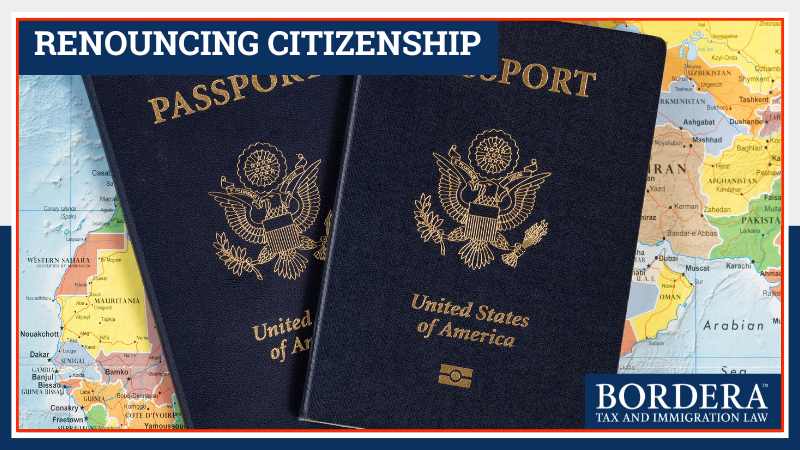
When a U.S. government shutdown occurs, it doesn’t just affect people living south of the border; it can disrupt consular services in Canada as well. For U.S. citizens living in Canada, including accidental Americans managing renunciation procedures, these shutdowns can create delays and uncertainty. The U.S. tax lawyers at Bordera Tax and Immigration Law explain how shutdowns may impact renunciation appointments, administrative fees, and overall processing times. Contact Bordera Tax and Immigration Law today for help booking or managing your U.S. citizenship renunciation appointment.
When a U.S. government shutdown occurs, it doesn’t just affect people living south of the border; it can disrupt crucial consular services in Canada as well. For U.S. citizens in Canada, including accidental Americans managing renunciation procedures, a shutdown can make scheduling mandatory renunciation interviews nearly impossible.
Consular officers perform several essential steps in the renunciation process. These include conducting in-person meetings to confirm intent, verifying identification, and collecting the mandatory administrative fee. The administrative fee, currently USD $2,350, is paid directly to the U.S. Department of State at the time of the interview. This fee funds the operational costs of processing renunciation applications and ensures the Department can maintain core consular services even when other parts of the government are affected by budget interruptions.
As of the current U.S. government shutdown, most U.S. consulates in Canada remain open and continue to process renunciation interviews, along with other essential services. However, the availability of appointments and the pace of processing depend heavily on how long the shutdown lasts and how staffing levels are managed during that period.
Because renunciation services are funded primarily through administrative fees collected from applicants, these programs can often continue operating even when government funding is paused. The fees provide a dedicated revenue stream that allows consulates to maintain a limited level of activity. That said, a prolonged shutdown can still disrupt normal scheduling if staffing or operational resources are redirected to higher-priority or emergency services.
Renunciation services are unique because they rely on the administrative fee, currently USD $2,350, paid directly by applicants. This model allows consulates to continue offering interviews and processing applications even when other departments face funding freezes. However, while fee-based operations can continue for a time, the scope of services may narrow if available funds run low or if additional administrative support becomes limited.
In the event of a long-term shutdown, fee-based funding might not fully cover ongoing operational costs, especially if the demand for services increases. Consulates could then shift their focus to essential duties, such as passport renewals, emergency travel documentation, and crisis response for U.S. citizens abroad. Routine renunciation appointments could become secondary, resulting in longer wait times and fewer available slots.
Another factor affecting renunciation services during a shutdown is staffing. Even though administrative fees help keep consulates open, local employees and officers may still be affected by temporary furloughs, reassignments, or reduced work hours. Fewer available officers can slow document processing, delay scheduling confirmations, and increase the likelihood of rescheduling existing appointments.
Applicants may also find that certain administrative tasks, such as fee processing, file verification, or case updates, take longer to complete. Reduced staffing can make communication between applicants and consular offices slower than usual, so individuals awaiting updates should plan for potential delays.
The lawyers at Bordera Tax and Immigration Law are advising clients to maintain their existing appointments whenever possible. If a consulate has already confirmed your interview, it is best to attend as scheduled unless you receive direct notice of cancellation or postponement. For new applicants, it’s important to anticipate potential delays when planning your renunciation timeline.
Applicants should monitor official consulate websites and communications regularly. Each consulate in Canada, whether in Toronto, Vancouver, Calgary, Ottawa, Halifax, Quebec City, or Montreal, may respond differently based on staffing, regional demand, and available funding. Staying informed ensures that applicants can respond quickly if their appointment needs to be rescheduled.
While renunciation services remain active for now, applicants should keep in mind that ongoing uncertainty could affect how the U.S. government prioritizes these functions. If fee-based funding becomes limited or staff resources are redirected to emergency cases, only urgent or essential requests may be processed until full operations resume.
Despite these risks, Bordera Tax and Immigration Law continues to assist clients throughout this process. From preparing documents to securing appointments and communicating with consular officials, the team ensures clients remain compliant and informed, even when government operations are unpredictable.
New applicants should expect possible delays and limited appointment availability for the renunciation of U.S. citizenship. While consulates intend to remain open as long as sufficient fee-based funding exists, backlogs and slower scheduling are likely, especially if the shutdown is prolonged or if staff resources are reallocated to emergency services.
In summary, renunciation interviews are not automatically canceled during a shutdown, but delays and prioritization of emergency cases are possible. Those seeking appointments for renunciation in Canada should monitor consulate updates closely and prepare for possible rescheduling or extended wait times.
If you are considering renouncing your U.S. citizenship, contact Bordera Tax and Immigration Law as soon as possible. Our experienced legal team can help you prepare your documents, understand potential timelines, and secure an appointment before further delays occur.
No. Most consulates remain open because renunciation services are fee-funded, though delays may occur. Ready to explore your options for renunciation? Contact Bordera Tax and Immigration Law today to book a consultation and we will help you navigate the process.
Not automatically. However, some consulates may postpone or reschedule appointments if the shutdown continues.
Because renunciation appointments are fee-based, consulates can continue offering limited services during a shutdown using those collected administrative fees.